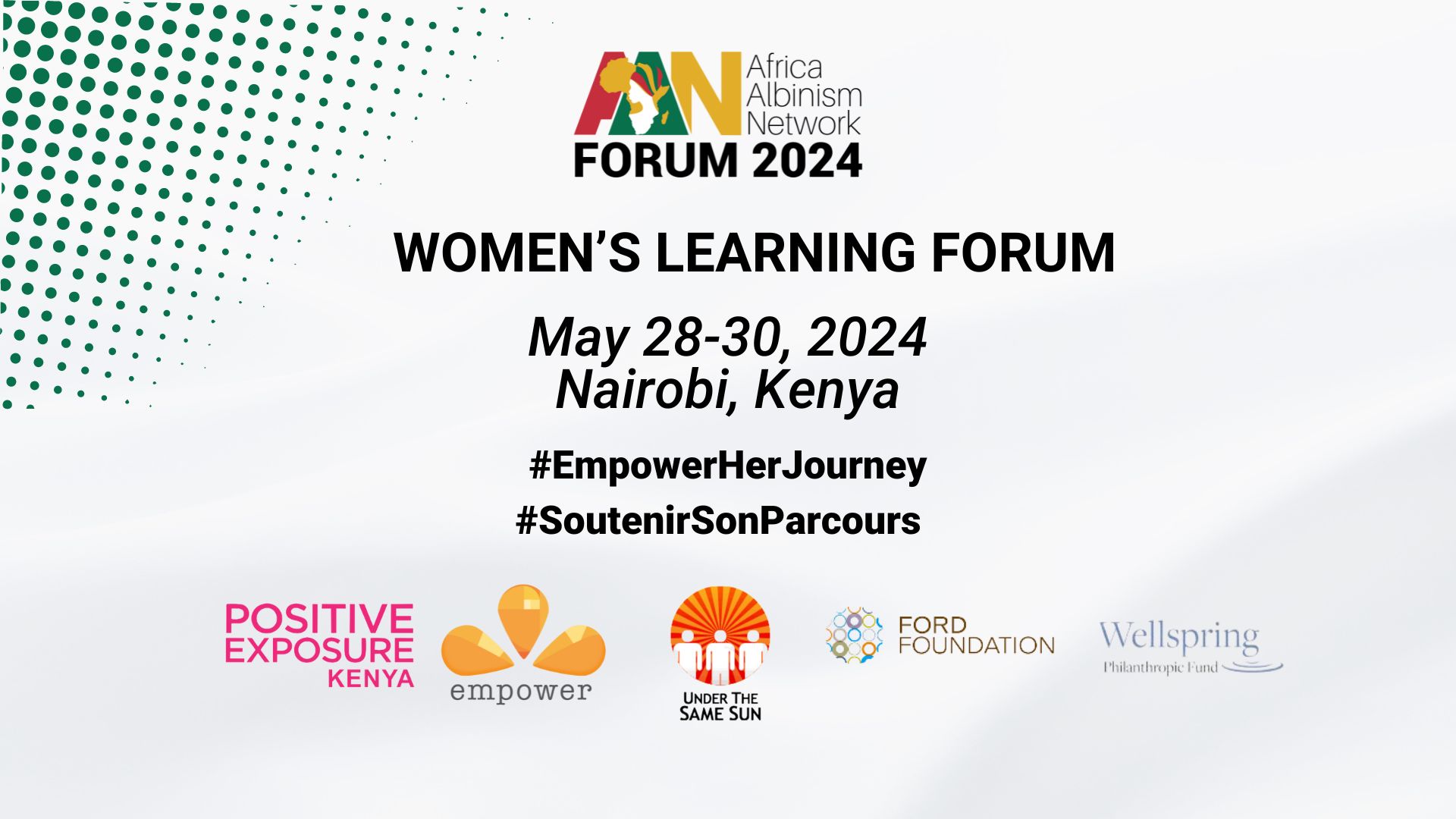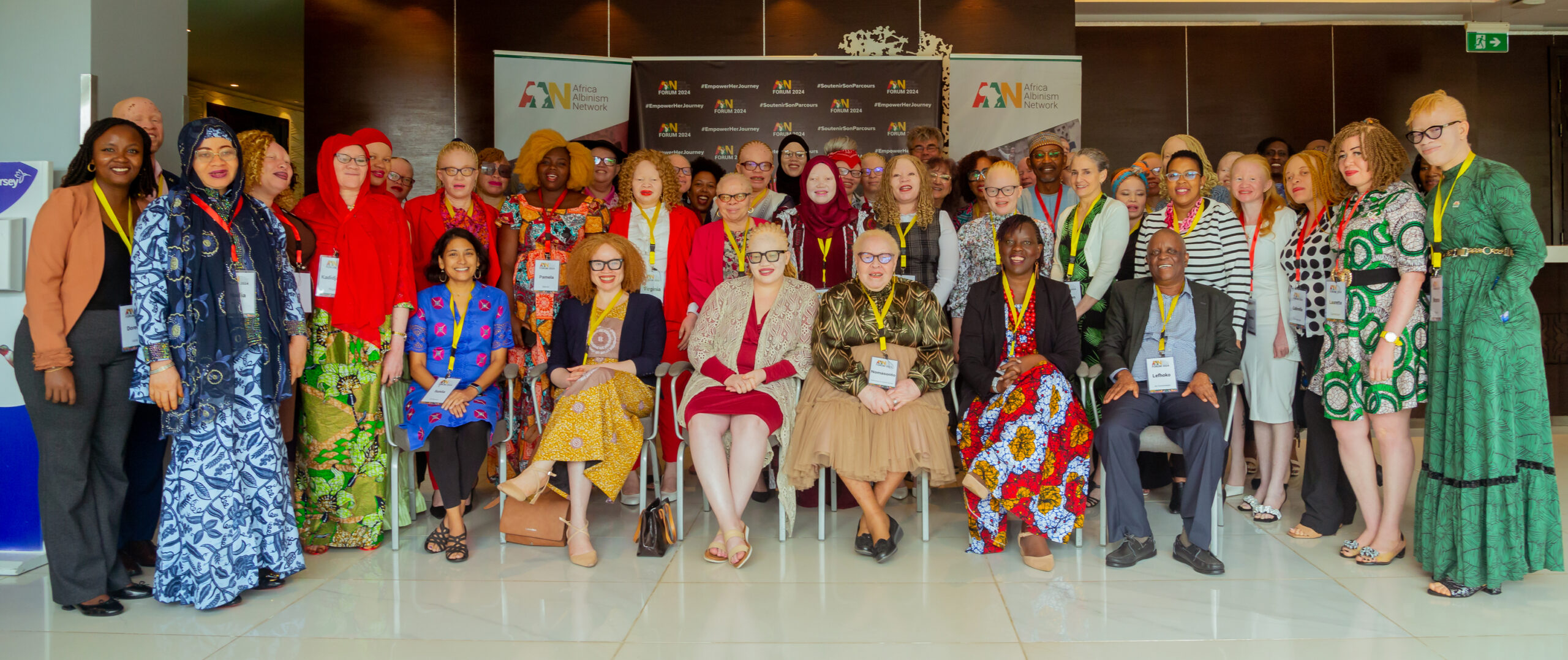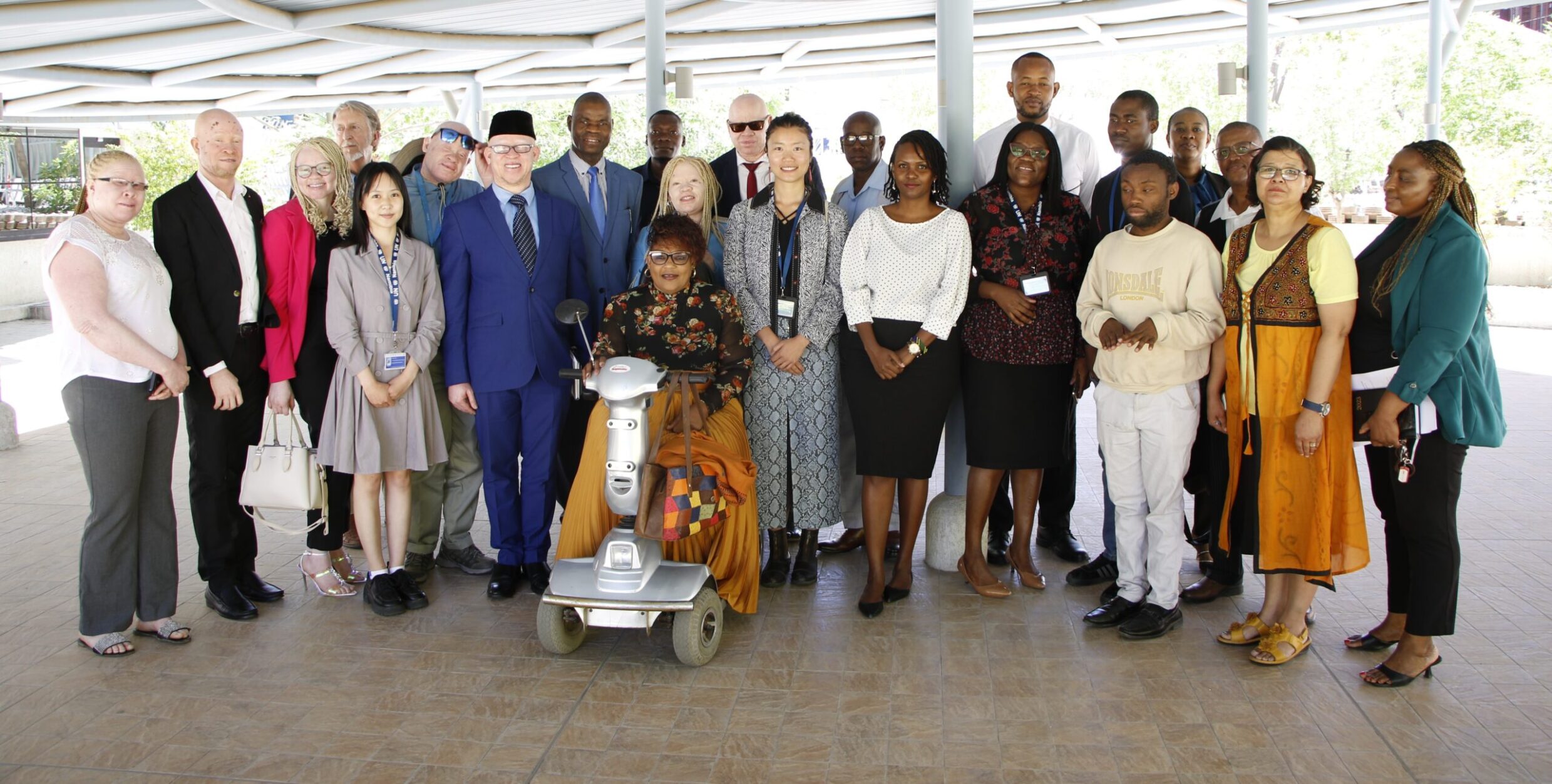We recently sat down on a call with Mr. Hassan Mikazi, the regional chairperson of the Tanzania Albinism Society (TAS) Morogoro since 2015, and his colleague Josephine Sayi, Regional Executive Secretary, to learn and celebrate the achievements of TAS Morogoro, the organization’s journey and challenges, and their hopes for the future.
Africa Albinism Network (AAN): What is TAS Morogoro’s story and where did the journey begin?
Hassan Mikazi: Due to increasing cases of attacks against persons with albinism in Tanzania, TAS Morogoro was established in 2006 to serve persons with albinism in Morogoro region. TAS Morogoro is a branch of the national office of TAS headquartered in Dar es Salaam.
I recall that at the time of the establishment of TAS Morogoro, there was no person with albinism at the helm of its leadership, except for a Government Social Welfare Officer who supported the organization to some extent. Active operations began in 2009 and in 2012, TAS Morogoro moved into a single room as its first physical office.
“We started small with a clear goal of making a social impact, we did not mind that we had neither computers nor enough funds to work with.”
AAN: Tell us more about TAS Morogoro’s operations?
HM: We operate as a regional body supporting the activities of our national office. We work in proximity with other disability organizations, private entities, and the Government, to ensure the smooth implementation and success of our projects.
TAS Morogoro is run and managed by persons with albinism, as all our activities are geared towards advancing the interests of PWAs in Morogoro and Tanzania at large.
AAN: What can you say are the key factors that contributed to TAS Morogoro’s success in expanding activities across Morogoro?
HM: Since assuming office in 2015…
“I prioritized putting in place advocacy systems, building the leadership capacity of the Morogoro team, encouraging volunteer sign-ups, and expanding partnerships with other successful organizations.”
In 2017, we partnered with the Center for Environment, Law and Good Governance (CELG) in Dar es Salaam with support from Voice Global in developing an educational project titled “Make Capitation Grants to School Children with Disabilities”. Through this partnership, we were able to set in place a Department of Education, Health, Monitoring & Evaluation, and others.
The Department of Health was instrumental in setting up a skin cancer intervention unit under the Morogoro regional hospital to help in early skin cancer detection and early eye check-ups.
We have since partnered with other organizations that provide technical and financial support to us, nurtured relationships with the media, and used social media to publicize and provide relevant information about what we do. This has helped our branch to remain vibrant and impactful and we gained the support of the local community.
AAN: What valuable lessons or insights did you gain from the experience of working with the Morogoro branch?
HM: Working with TAS Morogoro has helped me to be more accountable, transparent, and I’ve learned to value relationships. It has also broadened my network, personal exposure, and knowledge through various training and skills development.
AAN: It is impressive that TAS Morogoro was able to successfully engage its stakeholders and partners. Could you tell us more about the strategies or initiatives you implemented to achieve this?
HM: Through a curated fundraising strategy, yearly stakeholder mapping, regular courtesy visits, and media relationships we have been able to engage and maintain our stakeholders and partners.
Josephine Sayi: One other strategy we use is ensuring we have strong committed leaders in both administration and management, and a willingness for transparency.
AAN: Can you share with us a particularly successful project or initiative undertaken by TAS Morogoro? What were the goals, and how were they achieved?
HM: We have several projects that we have implemented, but a significant one that TAS Morogoro is proud of is the Unlocking Local Opportunities for People with Disabilities project funded by Voice from 2019 to 2023. Through this project, we finally got our own website and we were able to expand to all the districts in Morogoro.
We succeeded in establishing more than 126 groups of persons with albinism/disabilities in various economic activities, and a charter of demand was birthed (An advocacy document/tool, used in demanding for the enjoyment of human rights by persons with disabilities in Tanzania).
AAN: What are some challenges you faced as a leader and as an organization?
HM: In Morogoro, PWAs still face stigmatization. Most people are ignorant of what albinism is, therefore, we have to constantly raise awareness about albinism to educate communities. We face challenges educating the albinism community on how best to take care of themselves like promoting the use of wide-brimmed hats, protective clothing, and sunscreen. Some persons with albinism live in remote areas which makes it hard for us to reach due inadequate funds; and therefore, they always get left behind.
Another challenge we face is financial constraints. We would like to provide supportive educational facilities but are unable to do so due to limited resources.
As a leader, I have to think of ways to engage partners and source for funding opportunities.
AAN: How do you mitigate your security concerns? What mitigating measures do you take to protect yourself and your team from potential attacks?
HM: We work closely with the Government by communicating our presence to them. We have also established TAS ambassadors who work on behalf of us when we are unable to.
We also ensure the involvement of local authorities and traditional leaders before going to implement any activity or project.
JS: As a leader with albinism, social acceptance is part of the challenges I face. Local communities see us as problem solvers rather than as a bridge to meeting their needs.
AAN: What steps do you take to maintain a close-knit network with others beyond your key partners and stakeholders, especially local authorities, and people with disabilities for the success of your organization?
JS: We keep them updated through different activities by sending them quarterly & annual reports, so they stay up to date with our activities. We also show concern and care towards them, by finding out what their needs are and how we can help.
HM We sometimes participate in community, government, and private organization events. Our active participation in these events makes local stakeholders, donors, and partners remain committed to our cause. For instance, during International Women’s Day, we participated in commemorating the day by contributing some money to the “Morogoro Women Voice and Connection”, an organization in Morogoro, to be used for logistics. We have also commemorated Albinism Awareness Day (IAAD) in Morogoro since 2019 by establishing the only Miss IAAD competition in Morogoro region where both girls with and without albinism can contest.
AAN: What are some success stories or outcomes that resulted from the projects implemented by TAS Morogoro? How did these achievements positively affect the lives of individuals with albinism in the region?
HM: Through the Unlocking Local Opportunities for People with Disabilities project funded by Voice, persons with albinism were able to gain employment within the government and other local organizations. The Charter of Demand, which is a tool used by persons with albinism and disabilities in Tanzania, is used to advocate for their rights and to secure business loans and empowering opportunities.
JS: Another success story we have is the trust the government has in our organization. They trust us when we make demands, they see us as a faithful and committed organization that they can work with.
AAN: What is the way forward in the event that funding for TAS Morogoro slows down?
HM: The Linking and Learning project under the Voice program and Adventist Development and Relief Agency (ADRA)has helped us to strengthen partnerships with stakeholders. We have also set in place sustainable measures so our activities can continue. We also make sure the communities we work with have a sense of ownership of the projects implemented and we serve as facilitators. Some of these projects are income generating activities of poultry farming and vegetable gardens established at our office compound.
AAN: What tips do you have for other organizations who want to learn from you?
“Maintain integrity in all that you do, ensure you get recommended by other organizations, and through that review or assessment you will gain more trust and credibility. When people trust you, they will want to work with you; the more hands you join, the stronger and healthier community you build.”
AAN: What advice do you have for other albinism groups or the community as a whole?
HM: First to people with albinism, be confident in your abilities, you are no different from others without albinism. So, strive for excellence so that you can stand out.
JS: To albinism groups around Africa, collaborating with organizations like AAN further amplifies our work, so I strongly encourage it.
Hassan Mikazi is the Regional Chairperson of Tanzania Albinism Society (TAS) Morogoro chapter. He is a Sociology student at Jordan University College and an activist for the rights of persons with albinism (PWA) in Tanzania.
Josephine Sayi is the Regional Executive Secretary of TAS Morogoro chapter. She is a graduate of Project Planning and Management from the Institute of Rural Development Planning, Dodoma. Josephine believes that people with disabilities face many challenges but when it comes to women with disability, they tend to experience more challenges compared to other women.
To learn more about TAS Morogoro, check out their website here
Follow TAS Morogoro on Facebook here
Do you have an inspiring story of success to share with us?
We all love to hear success stories, because they inspire and motivate us to pursue our dreams and achieve greatness in our own lives. They serve as powerful reminders that with determination, hard work, and perseverance, we can accomplish remarkable feats. Success stories also provide valuable lessons and insights, showing us different paths to success and teaching us about the resilience and ingenuity of the human spirit.


